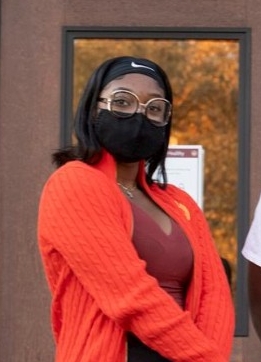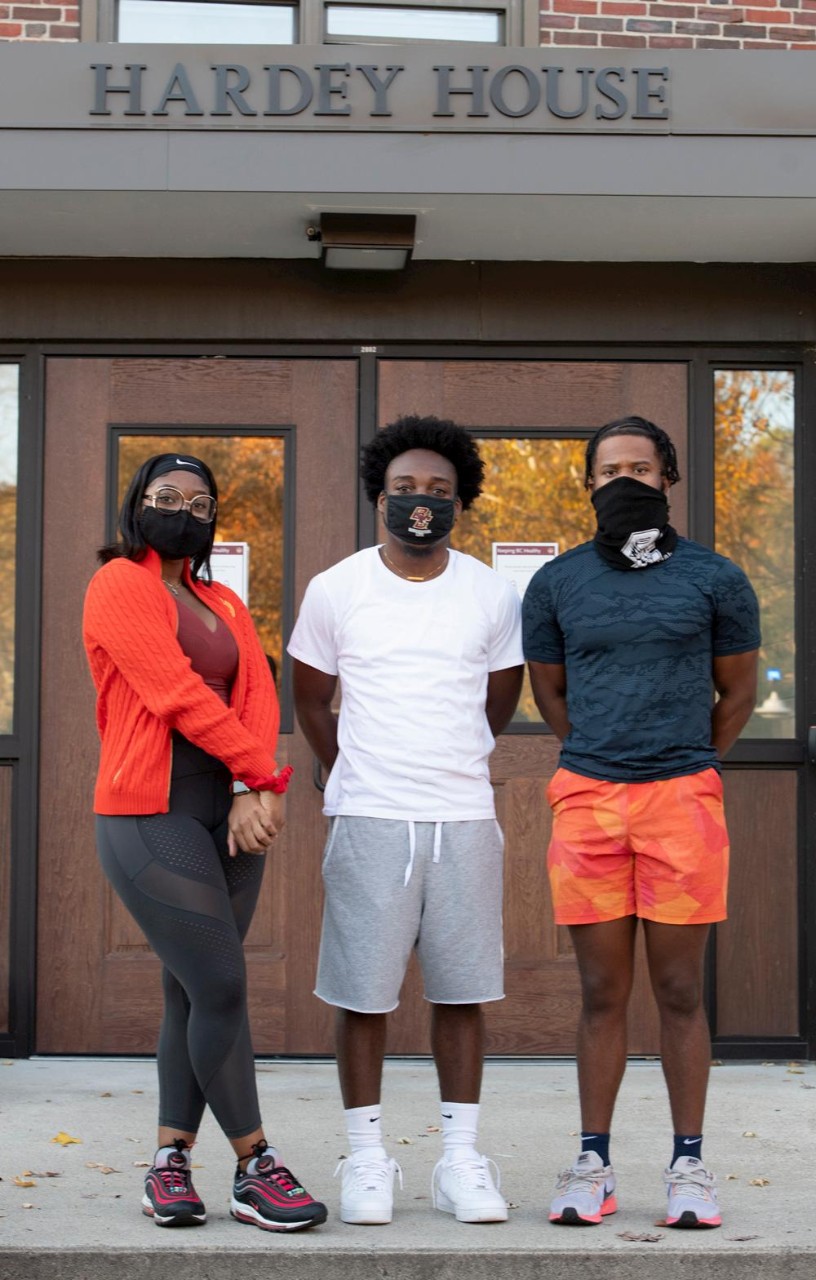BC F1RST resident Alexandra Kabo ’24, right, talks with Hardey Hall Resident Assistant Idris Council ’22, center, and Resident Director Marco Aurelien. (Peter Julian)
For first-generation college students, arriving on campus represents a milestone, a triumph over considerable odds. But it’s also only a beginning, and the rest of the way isn’t necessarily any easier.
That’s why, according to student affairs professionals and other experts, “first-gens” fare best when they have resources, including caring, committed campus staff, to help them face educational, social, and economic challenges markedly different from those of fellow undergraduates.
At Boston College, the newest such support, created by Learning to Learn, is BC F1RST, one of eight Living and Learning Communities, known as LLCs, administered by the University’s Office of Residential Life; LLCs such as Multicultural Learning Experience, Sustainability, and the Shaw Leadership Program offer the opportunity for students with shared interests or backgrounds to live alongside and regularly interact with one another. Fifteen first-year students make up the inaugural BC F1RST LLC cohort, which is housed in Hardey and Cushing halls on Newton Campus.
The BC F1RST LLC, an extension of BC’s similarly named college transition program, is a collaboration between Learning to Learn and Residential Life to offer initiatives, activities, and services—from guided group discussions on college life and other topics and informal to chat-about-what-you-want gatherings (although these have been constrained or moved to virtual formats because of the pandemic)—that enable first-gens to connect with one another, as well as with BC faculty and staff. These enable BC F1RST LLC members to develop support networks across campus and beyond—including with first-gen alumni—that will help them succeed at BC, administrators say.
“Coming from a similar background, our mindset is ‘We’re all in this together,’” she said. “You find out a little information, you share it with everyone else.”
One BC F1RST LLC student is Alexandra Kabo ’24, a biology major with a Spanish minor from Silver Springs, Md., who plans to become a doctor. She credits her mother, a Cameroon native who emigrated to America a few years before Kabo was born, as a source of inspiration and persistence.

Alexandra Kabo ’24
“America is viewed as a land of opportunity; that was always, and still is, my mother’s belief,” said Kabo. “She taught me that education, wanting to learn, is key—even if you’re not good at it, if you’re trying and you have the will, that’s all the matters. The emphasis on education has always been my foundation since I was a little girl, and I’ve placed high expectations on myself.”
Having attended Catholic schools, Kabo felt Boston College was the best place to fulfill those expectations, and the BC F1RST College Transition Program gave her a good start, introducing her to other first-gens—some of whom are now also part of the LLC—with whom she can share triumphs, setbacks, and handy details about college life.
“Coming from a similar background, our mindset is ‘We’re all in this together,’” she said. “You find out a little information, you share it with everyone else, even if it’s something like how you address a faculty member—if you’re used to calling your teacher ‘Mr.’ or ‘Mrs.,’ you don’t necessarily know you’re supposed to say ‘Professor’ or ‘Doctor.’ I look forward to our small group meetings, because we get to know each other, and be closer to one another.”
Working with ResLife to create a BC F1RST LLC just made so much sense. It’s helped to expand our office’s resources, and those of BC, to first-gen students in a new and important way. College life can be difficult for anyone, and first-gens can have challenges that go beyond financial. Yet these students come with a lot to offer—not just to BC, but the world beyond.
For all their commonalities, first-generation students have their own individual stories, and their own dreams and visions for the future. The BC F1RST LLC is part of BC’s efforts to ensure first-gens like Kabo experience the Heights in a way that suits their particular interests, personalities, and needs.
“Working with ResLife to create a BC F1RST LLC just made so much sense,” said Learning to Learn Director Rossanna Contreras-Godfrey. “It’s helped to expand our office’s resources, and those of BC, to first-gen students in a new and important way. College life can be difficult for anyone, and first-gens can have challenges that go beyond financial. Yet these students come with a lot to offer—not just to BC, but the world beyond.”
An average of about 260 first-generation undergraduates have enrolled at BC during the past five years, and in the last decade the percentage of first-gen students in the first-year class has ranged from nine to 11 percent. The University’s commitment to recruiting and retaining first-gens is reflected in its multitude of programs and resources, which in addition to BC F1RST and Learning to Learn include Options Through Education, the Montserrat Coalition, and the Thea Bowman AHANA and Intercultural Center.
That commitment was strengthened earlier this year by the University’s establishment—through a partnership with Pine Manor College—of the Pine Manor Institute for Student Success, to focus on recruiting and graduating more underrepresented and first-generation students. This year also has seen BC designated as a First-Gen Forward Institution by the Center for First-Generation Student Success; receive a five-year, $1.7-million federal TRIO Student Support Services grant to assist low-income, first-generation students, and students with disabilities; and enter into a partnership with QuestBridge, a highly respected non-profit program that helps high-achieving, low-income students gain admission and scholarships to the country’s top-ranked colleges and universities.
“It’s important to learn from others, to have a reciprocal relationship, so that you keep moving forward and find opportunities to see what works. So for BC F1RST students, I try to be positive and optimistic, but also honest and authentic.”
The BC F1RST LLC relies on a collaboration of administrators and staff to put ideals and plans into action, among them Learning to Learn Associate Director Karl Bell; ResLife’s Assistant Director for Residential Leadership and Learning Samantha Gordon and Mchenold (Marco) Aurelien, who is resident director for Hardey and Cushing halls; Amaris Benavidez, a Lynch School of Education and Human Development graduate student who is the graduate assistant for LLCs; Hannah Keeser, a Lynch School graduate student and a graduate assistant with Learning to Learn and ResLife; and Idris Council ’22, a resident assistant in Hardey.
They know—sometimes from personal or familial experience—that first-generation students have little or no points of reference about everyday college life and how to find help or guidance, and that these undergrads can feel self-conscious about their socioeconomic backgrounds; questions like “Do I really belong here?” can run in their minds.
The BC F1RST College Transition Program addresses these and other issues and concerns, and the LLC helps reinforce the message of support: Students are assigned a dedicated advisor at Learning to Learn and receive internship and career advice; first-year BC F1RST members also take the Applications of Learning Theory class, which covers areas like study skills, academic planning, and navigating the University; in addition, they participate in the BC Successful Start financial literacy program.
Administrators and staff say programs like BC F1RST recognize that first-gens often had to be their own counselors and advocates even as they strived for academic excellence—and that now, having achieved their dream of college, they should be able to focus on being students.
Kabo is quick to praise her mother’s dedication and steadfastness, but by middle school, she—a native French speaker—simply couldn’t help Kabo as much as before.
“At a certain point, I had to take it all on,” said Kabo. “I had to work hard for everything. When it came time for the college search process, I put together a thick notebook of information I collected, for my mother as well as me, and I met with my counselor three times a week. My feeling was, I knew my mother worked hard for me so now I had to work hard for her.”
Council remembers being a first-gen, first-year student like Kabo two years ago, and how Learning to Learn helped him adjust to life at BC—being an RA is “a way to give back and to build leadership skills,” he said. A Harlem, NY, native majoring in philosophy with a minor in management and leadership, Council sees his role as helping create a safe, supportive environment for the BC F1RST community, yet his own experience has taught him that college is a time to be adventurous and expand one’s world.
“My time at BC has been about finding people I feel comfortable with, but who push me to be better. It’s important to learn from others, to have a reciprocal relationship, so that you keep moving forward and find opportunities to see what works. So for BC F1RST students, I try to be positive and optimistic, but also honest and authentic.”

Kabo, Council, and Aurelien
It seems like an inauspicious year to launch a program like BC F1RST LLC, but Bell has a different view. “I think there’s no better time, actually. It gives us an opportunity to talk and work with first-gens during one of the most challenging times for higher education, and forces us to be at our best and most creative. These past several months have made us all appreciate the importance of human interaction—talking face to face, or even just shaking hands.
“So, for us at BC F1RST, developing inventive ways of capturing the quality of that interaction is vital at a time when it’s less possible,” added Bell, noting that Zoom has been a boon to linking BC F1RST students with first-gen alumni.
The personal touch still counts, however, and BC F1RST administrators and staff use it whenever they can. “For me, the thing is being visible,” said Aurelien, a native of Haiti who, along with two of his siblings, were first-gens. “Anytime I see these students—whether they’re hanging out or coming back from Main Campus, or we’re sharing meals or snacks—I celebrate them as if it were their birthday. I’m their supporter, their biggest cheerleader and want them to feel welcome.
“And I pound them with questions. It doesn’t have to be a formal, ‘what-are-you-going-to-do-with-your-life?’ conversation, just basics: How are you doing? How are you feeling? They know they can talk to me.”
Kabo wishes circumstances were different for her first year at BC, but she is philosophical about it all. “If something is just given to you, you don’t know how to work to get it. And you can even wind up becoming ungrateful that it’s there. So we’re going out of our way to brainstorm and find ways to gather and have fun, yet also stay safe—and I think we’ll actually get more out of this first year as a result.”
Sean Smith | University Communications | December 2020



